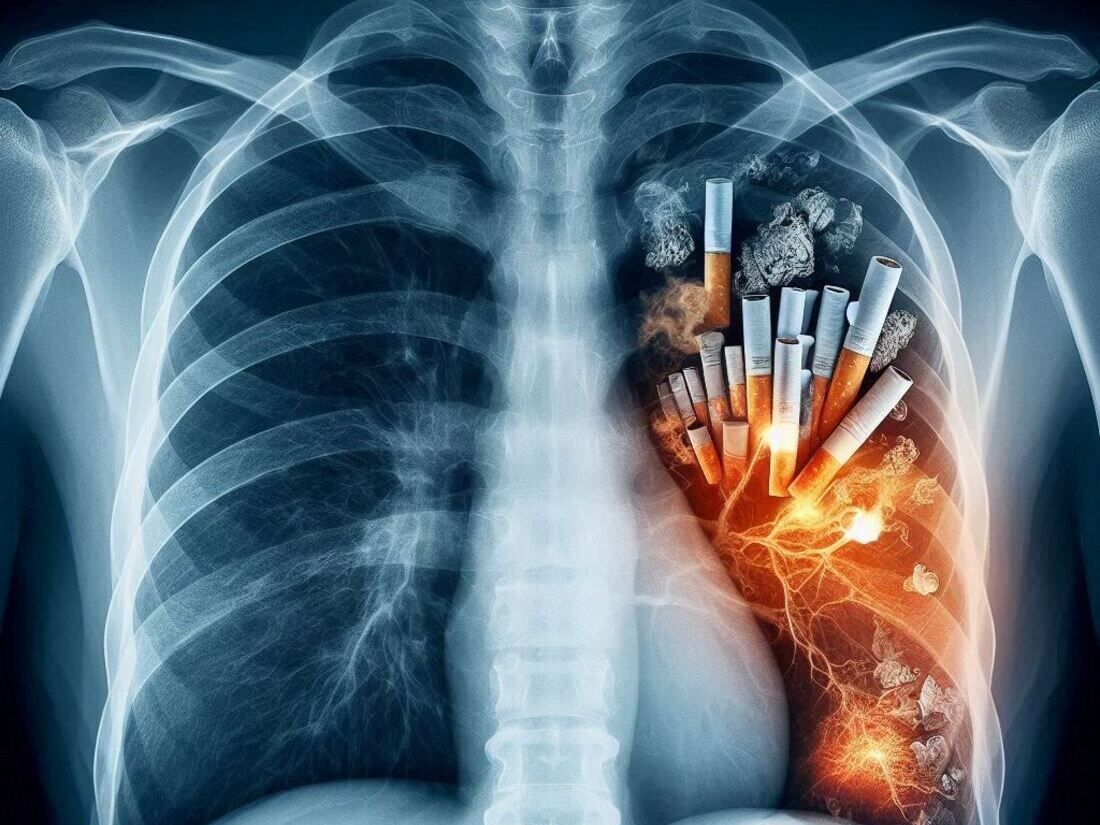Taking a deep, refreshing breath – a simple act that can feel like a struggle for smokers.
Smoking not only harms your overall health, but it takes a significant toll on your lungs, making breathing difficult and impacting your quality of life.

Did you know that cigarettes contain over 7,000 chemicals, many of them harmful and even carcinogenic (cancer-causing)?
When you smoke, these chemicals irritate and inflame your airways, leading to a variety of respiratory problems:
- Chronic Obstructive Pulmonary Disease (COPD): Smoking is the leading cause of COPD, a group of progressive lung diseases that make breathing increasingly difficult.
- Emphysema: This condition damages the air sacs in your lungs, reducing their ability to absorb oxygen.
- Chronic Bronchitis: Inflammation and narrowing of the airways lead to a persistent cough with mucus production.
- Lung Cancer: Smoking is the leading cause of lung cancer, and the risk increases with the duration and intensity of smoking.
The good news?
You can breathe easier and reclaim your health by quitting smoking.
Below are packed with tips and strategies to help you achieve smoke-free success and experience the life-changing benefits of quitting.
Understanding Your Pain Points: The Struggle to Breathe

Imagine struggling to climb a flight of stairs, feeling winded after a short walk, or experiencing constant coughing and wheezing.
These are just some of the daily difficulties faced by many smokers.
Smoking weakens your lungs and reduces their capacity, making even simple activities a challenge.
But it doesn’t have to be this way! Quitting smoking, no matter how long you’ve been smoking, can significantly improve your lung function and overall health.
Keys to Unlocking Success: A Personalized Roadmap to Quitting Smoking
Quitting smoking is a personal journey, and there’s no one-size-fits-all approach.
However, by understanding your triggers, creating a support system, and implementing effective strategies, you can increase your chances of success.
Here’s your personalized roadmap to becoming smoke-free:
- Set a Quit Date and Mark Your Calendar: Choose a specific date in the near future to quit smoking. Marking it on your calendar and sharing it with loved ones can increase accountability.
- Identify Your Triggers: Recognize situations that tempt you to smoke. Is it stress after work? Social gatherings? Boredom? Once you understand your triggers, you can develop coping mechanisms.
- Develop Healthy Coping Mechanisms: When a craving hits, reach for a healthy alternative. Take a brisk walk, practice relaxation techniques like deep breathing or meditation, chew sugar-free gum, or suck on hard candies.
- Tell Your Support System: Inform family, friends, and colleagues about your decision to quit. Their encouragement and understanding can be invaluable. Let them know how they can best support you, whether it’s avoiding offering cigarettes or distracting you during cravings.
- Consider Nicotine Replacement Therapy (NRT): NRT products like patches, gum, or lozenges can help manage cravings and withdrawal symptoms. Talk to your doctor about which NRT option is right for you.
- Join a Support Group: Connecting with others who are quitting smoking can provide encouragement and a sense of community. Support groups can be found online or in your community.
- Seek Professional Help: If you’re struggling, don’t hesitate to talk to your doctor. They can provide resources, medications, and personalized support to help you quit.
Benefits Beyond Breathtaking Views: The Rewards of a Smoke-Free Life

The benefits of quitting smoking extend far beyond just improving your breathing.
Here’s what you can expect:
- Improved Lung Function: Within just a few weeks of quitting, your lung function starts to improve, making breathing easier. You might notice a significant reduction in coughing and wheezing.
- Reduced Risk of Disease: The risk of heart disease, stroke, and cancer starts to decline significantly after quitting. Quitting smoking is an investment in a longer and healthier life.
- Enhanced Sense of Taste and Smell: Quitting can improve your ability to taste and smell, allowing you to appreciate food and flavors more fully. Imagine enjoying the full taste of your favorite meal again!
- Increased Energy Levels: Quitting can boost your energy levels and improve your overall well-being. You might find yourself having more stamina for activities you enjoy.
- Financial Savings: Smoking is an expensive habit. Quitting can save you a significant amount of money on cigarettes and healthcare costs.
The Power of Information: Frequently Asked Questions (FAQs)
- What are the withdrawal symptoms of quitting smoking? Common withdrawal symptoms include cravings, irritability, anxiety, difficulty concentrating, and fatigue. However, these symptoms are temporary and typicallysubside within a few weeks.
- How long does it take to improve my lung function after quitting smoking? You may notice improvements in your breathing within just a few days of quitting. Your lung function will continue to improve over time, with significant benefits experienced within months and years.
- Can I still vape if I’m trying to quit smoking? Vaping is not considered a safe alternative to smoking. While it may contain fewer harmful chemicals than cigarettes, vaping still delivers nicotine, which is addictive and can have negative health consequences.
Maintaining Momentum: Tips to Avoid Relapse
Quitting smoking is a marathon, not a sprint. There will be challenges and moments of temptation.
Here are some tips to help you stay on track:
- Avoid Triggers: Once you’ve identified your triggers, actively avoid them. If social gatherings are a temptation, suggest alternative smoke-free activities. If stress is a trigger, prioritize relaxation techniques and healthy coping mechanisms.
- Celebrate Your Victories: Acknowledge your progress, no matter how small. Celebrate milestones like a week, a month, or a year smoke-free. Reward yourself with something you enjoy, but avoid using food or other unhealthy options.
- Be Prepared for Setbacks: Everyone experiences setbacks. Don’t let a slip-up derail your entire journey. Acknowledge it, learn from it, and recommit to your goal of being smoke-free.
- Maintain Your Support System: Continue to rely on your support system. Share your struggles and successes with them. Their encouragement can be a powerful motivator.
- Seek Support When Needed: Don’t be afraid to ask for help when you need it. Talk to your doctor, counselor, or support group for additional guidance and support.

Visualizing Success: Embracing a Smoke-Free Future
Imagine yourself waking up with renewed energy, breathing deeply and effortlessly.
Picture yourself enjoying physical activities without feeling winded.
Envision yourself savoring the full taste and smell of your favorite foods.
Quitting smoking is not just about giving something up; it’s about embracing a healthier, happier you.
It’s about reclaiming your breath, your health, and your life.
Take the First Breath of Your Smoke-Free Journey

Are you ready to breathe easier and live a healthier life?
Take the first step today!
Talk to your doctor about creating a personalized quit plan.
Share this blog with someone you know who might be considering quitting.
Together, let’s create a smoke-free future!
Additional Resources:
- American Lung Association: https://www.lung.org/
- Centers for Disease Control and Prevention (CDC): https://www.cdc.gov/tobacco/index.html
- Smokefree.gov: https://smokefree.gov/
Disclaimer:
The information in this blog is for educational purposes only and should not be construed as medical advice. Always consult with a healthcare professional for personalized guidance on quitting smoking.



